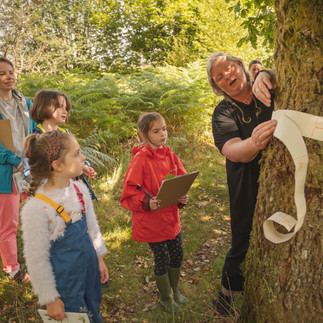Biosphere Explorers 2 Wraps Up
- Carys Mainprize
- Apr 8, 2022
- 3 min read
Biosphere Explorers 2 project officer, Carys, reflects on what the education project has achieved.
There is so much to be said for learning by doing and the magic of first-hand experiences. I can think back to my own memories of learning and not a single typical classroom day is among them. Chiefly, I recall the ‘Tudor Day’ where the class dressed up as young ladies and lords (or peasants!) and tried foods of the time, learnt customs, and went outdoors to learn class-appropriate party tricks. This was two decades ago now, and still such a strong memory for me. The Tudors have been my favourite period of history since.
We know that play is so important for children to learn, and to take them outside to do so is even better. We have so much nature on our doorstep here that it would be silly not to; a recent outdoor session with Kirkcudbright primary school even featured a perturbed pheasant on the edge of the school grounds. Imagine that!

The same session included early wildflowers, like celandine, learning about catkins, and safe risk taking by manoeuvring amongst brambles. And yet, the same session with Dalry primary school featured instead a discovery of bones (possibly rabbit), a discussion on how not to disturb the hedgehog hibernating in their polytunnel, and a search for sprouting plants. Half of the fun – and importance – of outdoor learning is about adapting to what the children find and are interested in. There is no point in treating it as an outdoor classroom, keeping pupils firmly on task and not indulging their curiosity. Play is how children learn, yes, but curiosity is the driving force of their passion. It must be nurtured and rewarded, and it is a joy to do so.

Biosphere Explorers 2, our outdoor learning project, will come shortly to an end. It has been, at times, tricky to get face-to-face learning due to COVID precautions, but we did succeed in holding a series of four Summer activities, a climate change and COP26 series of school sessions in Sept/Oct, and in the last 6 weeks an indoors science experiment, and outdoors plant life cycle session, for the schools in the project area. We have also created a series of videos around a soil experiment, which will go live soon – check back on the blog for that.

This project works with primary schools in the Galloway Glens Landscape Partnership project area, as they are our fantastic funders, and the opportunity to contribute to the pupils’ memories of learning has been delightful. I hope that, just like me, two decades later they can still recall the sessions in good detail.
Happily, there is a legacy attached to the project. The recent lesson plans and soil experiment series will be available on our website shortly (and will be announced with a blog), as well as available for teachers across Dumfries and Galloway in a couple of months' time.

And it would be remiss of me not to mention the absolutely fantastic legacy pack of the first Biosphere Explorers. Created by the previous education officer Shalla Grey, these packs include a series of 5 workshops, a whole host of activities, and even a board game on greenhouse gases. You can find the resources online (although not the board game), but teachers can also borrow the physical copy for their classes – just get in touch with us at info@carboncentre.org. It suits p5-7s best, but could be adapted for a class above or below too.
We’re excited to be developing our next education project, but until we’re ready to announce that, we will leave you with some of our favourite photos from photographer Duncan Ireland, courtesy of our funders Galloway Glens.

























Comments